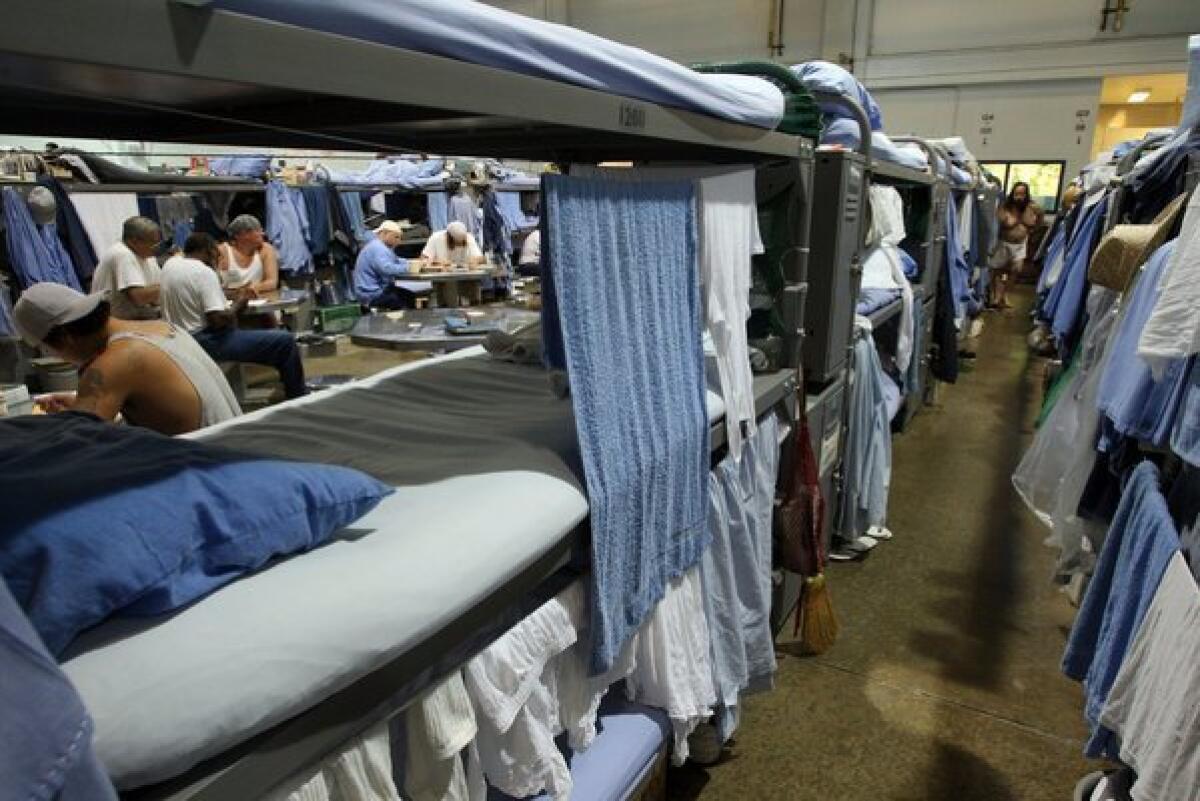An odd conservative split on Propositions 34 and 36

A fascinating dichotomy has emerged between the two criminal justice initiatives on the Nov. 6 California ballot. Both are aimed at reducing harsh sentences and thus saving the state money, yet one has attracted support from conservatives and is expected to win handily, while the other is opposed widely by conservatives and trailing in the polls. Why?
Proposition 36, which would tweak the state’s three-strikes sentencing law by making it less likely that third-strikers who commit minor crimes end up with life terms, has been endorsed by Republican law-and-order types such as L.A. County Dist. Atty. Steve Cooley, and such GOP heavy-hitters as tax watchdog Grover Norquist of Americans for Tax Reform. Bipartisan support for the measure probably explains why its passage is all but assured. A USC Dornsife/Los Angeles Times poll last month found 66% of voters supporting the measure with only 20% opposed, and although other surveys have pegged the race as a closer call, none have shown a margin of less than 2-to-1 in favor of the initiative.
That’s a sharp contrast with Proposition 34, which would replace the state’s death penalty with a sentence of life without the possibility of parole. The USC/Times poll found it trailing 38% to 51%. And while it does have some conservative backers, they’re not as influential as those supporting Proposition 36. Perhaps the most prominent is Don Heller, a Republican prosecutor who drafted the ballot initiative that reinstated California’s death penalty in 1978 but who now thinks it was a terrible mistake. The overwhelming majority of Proposition 34’s supporters are Democrats or liberal organizations such as the American Civil Liberties Union. A Field Poll last month found that 50% of Democrats support it, but only 23% of Republicans.
ENDORSEMENTS: The Times’ recommendations for Nov. 6
What’s puzzling about this is that in many ways, the two initiatives are quite similar. In his statement endorsing Proposition 36, Norquist said: “The Three Strikes Reform Act is tough on crime without being tough on taxpayers. It will put a stop to wasting hundreds of millions in taxpayers’ hard-earned money, while protecting people from violent crime.” One could say the exact same thing about Proposition 34, which has not met Norquist’s favor.
Both ballot measures are aimed at ending injustices, or potential injustices. Proposition 36 would end some of the more outrageous abuses of the three-strikes law, such as when prosecutors pursue life sentences against third-strikers for stealing something to eat. Proposition 34 would eliminate the possibility of executing an innocent person, while still protecting society from killers by ensuring they die behind bars. Both would save taxpayers money; the state Legislative Analyst’s Office says Proposition 36 could save up to $90 million annually in corrections costs, and Proposition 34 would save “several tens of millions of dollars annually” (one key study pegged it at $184 million a year).
So why have many conservatives overcome their traditional wariness of measures that seem to coddle criminals in the case of the three-strikes law, but not when it comes to capital punishment? Most likely, it has something to do with conservative notions of justice. Even the stingiest Republicans are willing to spend government money on laws that uphold their sense of justice; Proposition 36 does, while 34 doesn’t.
One doesn’t have to be too sympathetic with criminals to see that putting someone away for life for stealing a slice of pizza or shoplifting less than $20 worth of merchandise (both have happened in California) isn’t very just, regardless of that person’s criminal history. Proposition 36 has a variety of safeguards to ensure that dangerous criminals still end up with life terms. It doesn’t do away with the three-strikes law; it just makes it a little more humane.
The death penalty, meanwhile, has become something of a bedrock social issue for conservatives -- certainly not as much of a hot button as abortion or same-sex marriage but a core principle all the same. The idea that those who kill should themselves be killed fits with biblical precepts (eye for an eye, tooth for a tooth and all that) and provides visceral satisfaction to victims’ loved ones. How does this zeal for blood square with conservative dogma on abortion, in which the sanctity of life trumps all? Liberals have been using those seemingly opposing stances to try to tar conservatives as hypocrites for decades, but the difference isn’t hard to find: For the religious right, fetuses are without stain, while killers have committed the ultimate sin and deserve to pay with their lives for their crimes.
All of this suggests that the backers of Proposition 34 have some work to do if they’re going to get enough Republican and independent votes to put the measure over the top. The argument that the courts aren’t infallible and some death row inmates may in fact be innocent doesn’t seem to penetrate the conservative skull, perhaps because, with little experience in the criminal justice system themselves, conservatives actually think it is infallible. Statistics about racial unfairness -- killers are much more likely to get the death penalty if their victims were white -- also fall on deaf ears, since conservatives are overwhelmingly white themselves and not particularly outraged by that sort of thing.
What might sway them is the pocketbook argument, combined with the let’s-stick-it-to-the-criminals argument. The cost of appeals, housing and security for death row inmates is staggering, and could be wiped out if capital punishment were abolished. Meanwhile, death row inmates almost never work or pay restitution to victims’ families, because they’re considered too high a risk for work assignments. That might change if, under Proposition 34, they were housed with the general high-security population. That means they’d have to spend their days working instead of watching TV. And almost nobody gets the revenge they expect when a killer is sentenced to death: California has executed just 13 people since the death penalty was reinstated in 1978. Why pay for an execution service you’re not getting?
None of that is going to overcome longstanding conservative dogma on the death penalty. But sometimes what people do in the voting booth isn’t what their party platform endorses.
ALSO:
Endorsement: Obama for president
Endorsements: The Times’ recommendations for Nov. 6
The U.S. defense budget: It’s even bigger than Obama suggested
Subscribe to Dan Turner on Facebook
More to Read
A cure for the common opinion
Get thought-provoking perspectives with our weekly newsletter.
You may occasionally receive promotional content from the Los Angeles Times.






